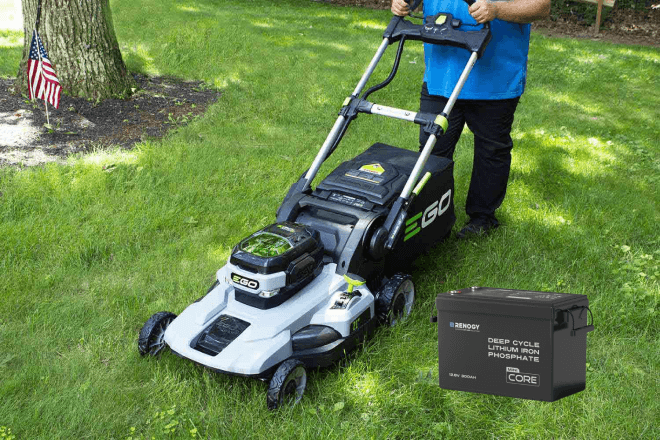How Long Does a Lawn Mower Battery Last?
October brings more than just falling leaves – it's the perfect time to give your lawn that final pristine cut before winter sets in. While your neighbors struggle with gas-powered mowers in the crisp autumn air, imagine the quiet efficiency of a battery-powered lawn mower gliding through your yard. However, for those relying on battery-powered lawn mowers to keep their yards pristine, a crucial question often emerges: How long does a lawn mower battery last? Understanding the lifespan of your mower's battery isn't just about avoiding the inconvenience of a failed start; it's crucial for maintaining your lawn care routine and protecting your investment.
Types of Lawn Mower Batteries
Batteries are an integral part of the lawn mower. Similar to a car, they provide the crucial starting jolt for starting a mower’s engine. This energy is measured in Cold Crank Amps (CCA). A good battery must be able to supply enough amperage to the solenoid until the engine starts.
Finding a reliable mower battery is crucial. There are mainly two types of lawn mower batteries on the market today; lead-acid and lithium-ion batteries. Let’s take a look at each in great detail to help you decide.

Lead-Acid Batteries
Lead-acid batteries are very common and have been a dependable option for lawn mower owners for quite some time. These batteries typically last between 3-5 years with proper maintenance, though their lifespan can be significantly affected by usage patterns and storage conditions. While a single charge might power your mower for about 1-2 hours of continuous mowing, their capacity tends to gradually decline after the first year of use. Despite their shorter lifespan and heavier weight, they remain a cost-effective option for budget-conscious homeowners.
Lithium-ion Batteries
Compared to lead-acid, lithium-ion batteries are more efficient and require little maintenance. With proper care, these batteries can maintain their performance for 7-10 years, offering significantly longer service life than their lead-acid counterparts. A fully charged lithium-ion battery typically provides 1-2 hours of mowing time, but unlike lead-acid batteries, they maintain consistent performance throughout their lifespan until near the end. While they come with a higher initial cost, their extended lifespan and reliable performance often make them more economical in the long run.
There are several types of lithium batteries but for a lawn mower, we recommend you stick to LiFePO4 batteries. They last longer than most lithium types and generally have lower energy densities.
This means they were created for power-hungry items like buggies, boats, cars, RVs, and of course mowers. These utilize an iron phosphate cathode rather than manganese oxide or cobalt dioxide like other lithium variants.
How Long Does a Lawn Mower Battery Last?
On average, you can expect your lawn mower battery to last between 3-10 years, depending on the type you choose and how you use it. Most homeowners typically get about 500 charging cycles from their mower battery before noticing a significant decrease in performance. In terms of running time per charge, expect 45-60 minutes of actual mowing time for a standard residential lawn.
But here's the thing – these numbers are just the starting point. Your actual battery life largely depends on your mowing habits. If you're tackling thick, wet grass or navigating hilly terrain, expect your battery to drain faster than when mowing dry, level lawns.
The weather plays its part too – extreme temperatures, especially harsh winters or scorching summers, can significantly impact battery longevity. Most manufacturers recommend mowing in temperatures between 40-80°F (4-27°C) for optimal battery performance.
Even your mowing technique matters. A battery used weekly for a small yard will likely outlast one pushed to its limits on a large property twice a week. Here's a pro tip: maintaining your grass at 2-3 inches typically requires less power than giving your lawn an extremely close cut, which can help extend your battery's lifespan.
Factors Affecting Lifespan of Lawn Mower Battery
The lifespan of a lawn mower battery can vary depending on several factors like the type of battery, usage patterns as well as charging habits. Let’s look at each factor in detail to see how they affect battery lifespan.
Battery Type
For a mower battery, you can opt for lead-acid or lithium-ion. Both types have different lifespans. A lead-acid battery will give you 3-5 years if properly maintained. However, a lithium-ion battery can go beyond 10 years. Other factors like battery quality must be considered when buying batteries.
Always, look out for reputable brands because most of these are made with high-quality materials. It’s also worth noting that certain battery types like gel cells are sensitive to higher amperage. If you use high-powered mowers, avoid these when looking for a battery replacement.
Usage Patterns
How frequently you use your lawn mower and what settings you apply also have an impact on the lifespan of the battery. If you mow large areas or rough terrain regularly then your battery lifespan will be impacted. Rough terrains tend to strain the battery, forcing it to drain much faster. Doing this more consistently will reduce the charge cycles and ultimately cut the lifespan.
Charging Habits
Improper charging habits will impact the general lifespan of your mower battery. Avoid letting your battery drain completely before recharging, as deep discharges can significantly shorten its life. Instead, try to recharge when the battery still has about 20% power left. Also, always use the manufacturer's recommended charger to prevent potential damage from incorrect voltage or current.
Storage Conditions
Where and how you store your mower during the off-season is crucial. Batteries stored in environments with extreme temperatures (like uninsulated garages or outdoor sheds) typically lose capacity faster. The ideal storage temperature is between 40-80°F (4-27°C), and your battery should be kept at about 40% charge during long-term storage – not fully charged or completely empty.
Maintenance Schedule
Regular maintenance isn't just about cleaning your mower. Check battery terminals monthly for corrosion and ensure they're clean and properly connected. A loose or corroded connection forces your battery to work harder, reducing its overall lifespan. Additionally, keeping your mower's blades sharp reduces the strain on your battery – dull blades require more power to cut effectively.
How Do I Know My Mower Needs a New Battery?

A weak battery will strain the mower’s battery, potentially damaging more expensive parts. Replacing the battery in time ensures that your mower does its job efficiently. But how do you know that your mower needs a battery replacement? Here are some helpful tips for identifying if you need a new battery.
Observe if the Mower is as Smoothly as at the Start
Over time you might notice the mower isn’t as efficient at cutting grass as it was when you first used it. If you notice this then most likely there’s a problem with the batteries. Batteries have to deal with consistent vibrations caused by the running blades which may cause them to decline over time. Before buying a new battery, check for loose connections to ascertain that all the terminals are connected.
Shorter Runtime
Another telling factor that you need a battery replacement is when your mower runs a shorter time than it used to. If your mower initially ran between 40-60 minutes but drastically cuts the runtime to let’s say 10-15 minutes, you need to replace the battery.
Clicking Sound When You Start Your Mower
If you start your lawn mower and hear a clicking sound, consider replacing the batteries. The clicking sounds often mean that the batteries lack the required capacity to power the mower. So, replace the batteries to ensure your mower’s performance and longevity isn’t affected.
Check the Voltage Using a Multimeter
Another way you can verify if you need a battery replacement for your mower is by using a multimeter. Check the mower’s electrical system for a voltage drop when you notice a change in its functionality. If you do find a drop, it means the batteries have weakened and need to be replaced.
Maintenance Tips for Your Lawn Mower Battery
Want to get the most out of your lawn mower battery? Here are some quick but effective maintenance tips to keep it running strong, reducing strain on the motor and other components.
Charge Your Batteries Regularly
Discharge is one of the biggest killers of batteries. Make sure to charge your batteries in between use to keep them healthy. If you plan to store the mower through the winter season, use battery maintainers to keep the battery at a healthy level until the time comes when you need to mow the lawn.
Use the Right Charger
Use the right charger to top off your batteries. Make sure the charger you are using is of the right voltage. Higher-voltage chargers will damage the battery cells reducing the longevity and performance of the battery.
Keep the Battery Terminals Clean and Dry
Make sure to clean the battery terminals before storing the mower. Also, watch for any battery corrosion when inspecting the lawn mower battery. Corroded terminals can be cleaned using a brush dipped in a solution of baking soda and water.
Check Water Levels Regularly
If you are using the flooded or wet cells, check the water levels regularly. If you notice a drop in the levels, add enough distilled water until the plates are covered completely.
Check for Loose Connections
Also, make sure all the necessary connections are in place before starting to mow. Loose connections will cause a strain on the battery, forcing it to work hard or fail completely.
Conclusion
Understanding how long a lawn mower battery lasts isn't just about knowing the numbers – it's about making informed decisions for your lawn care needs. You can expect 3-10 years of service from your battery depending on its type, proper maintenance and care can help push that lifespan to its upper limits.
Frequently Asked Questions
1. What can drain my lawn mower battery?
There are several possible reasons why your mower drains. Some are pretty obvious like leaving it powered on when not in use. Other possible reasons include not properly charging it, thicker grass, and more intense mower settings, among others.
2. Why does my lawn mower battery die so quickly during use?
If your battery is draining unusually fast, several factors could be at play: your grass might be too wet or tall, your mower's blades could be dull (requiring more power), or your battery might be nearing the end of its life cycle. First, try cutting dry grass and ensure your blades are sharp. If the problem persists, check the battery's age and charging history.
3. Can I leave my lawn mower battery on the charger all winter?
No, this is actually harmful to your battery's lifespan. Instead, store your battery at about 40% charge in a cool, dry indoor space. Only charge it fully when you're ready to use it again in spring. Continuous charging can lead to reduced battery capacity and shortened lifespan.










